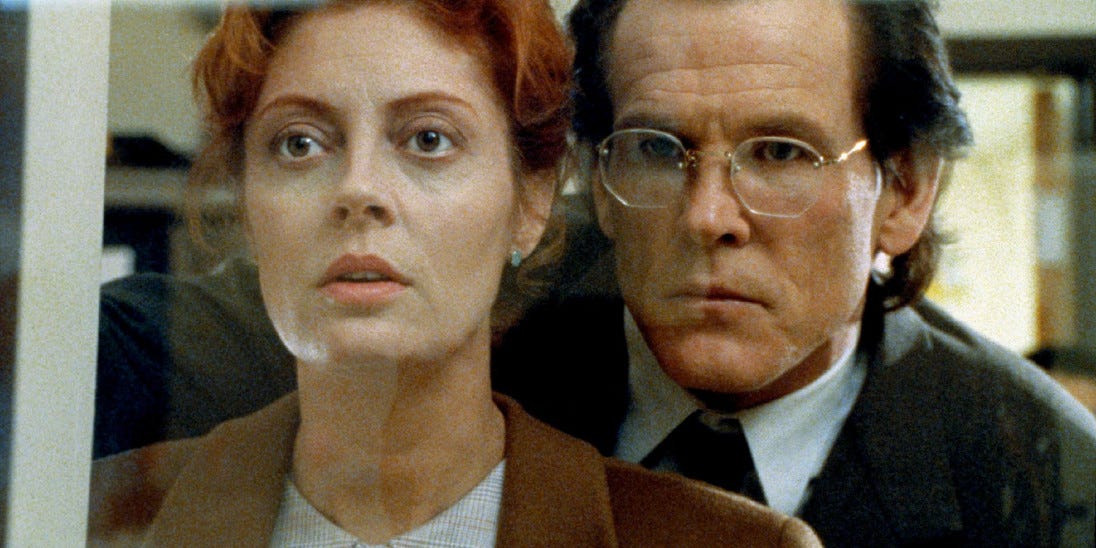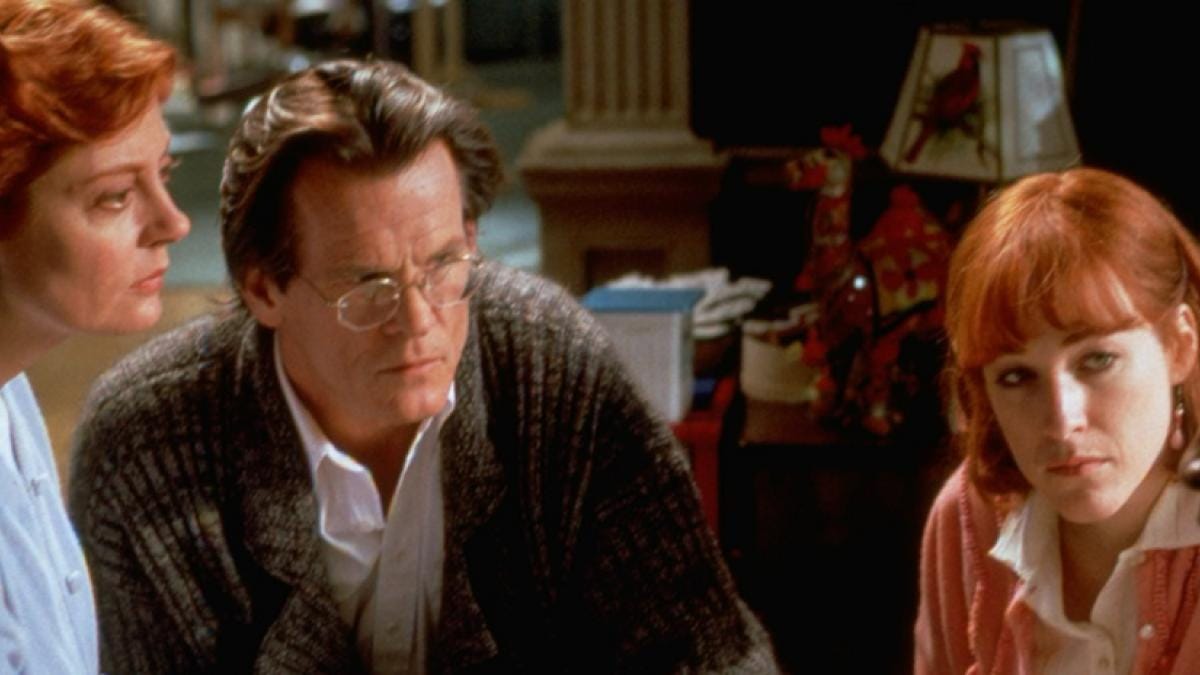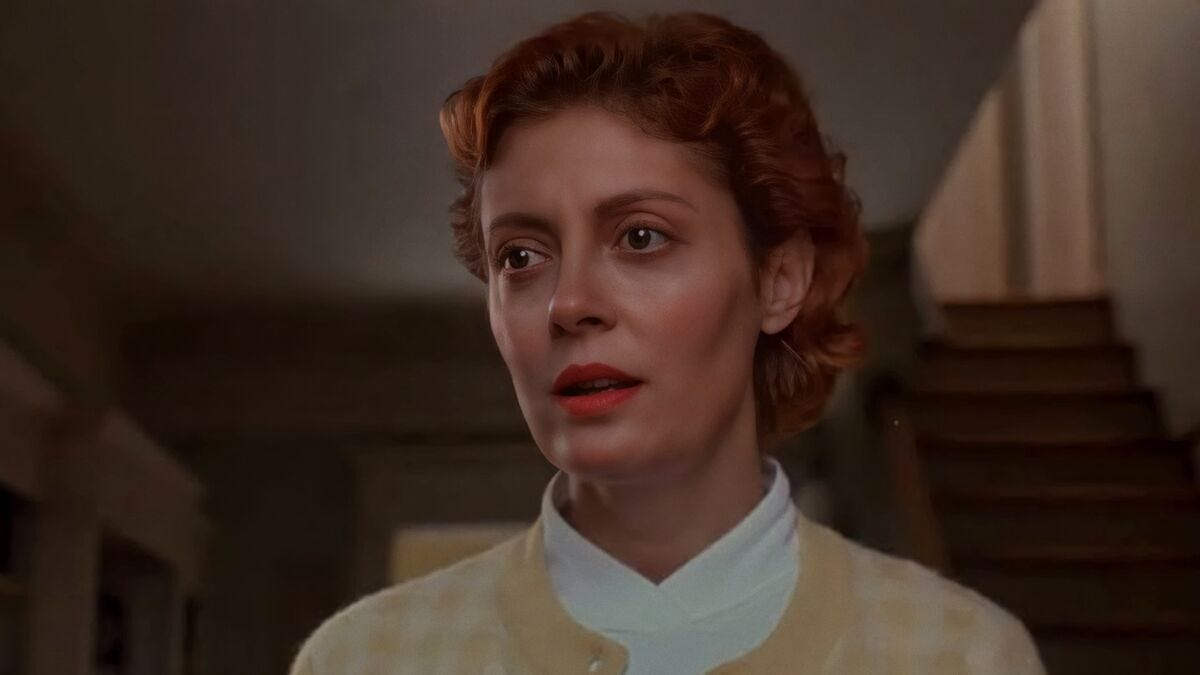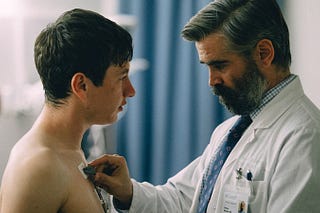
When Terminal Disease Got the 'Mad Max' Treatment
Given the true story of a family fighting a rare and fatal neurological condition, George Miller opted to step on the gas.
When George Miller made Lorenzo’s Oil in 1992, his filmography was limited to the first three Mad Max movies, all steeped in the gonzo, cartoonish, breathlessly paced tradition of Ozploitation and The Witches of Eastwick, a Hollywood debut that cranked up the volume on John Updike’s supernatural bestseller. But genres have a tendency to either attract certain types of stylists or enforce their own set of rules: It may be great for the camera to fly around in the chaos of screen fantasies, but in the face of real anguish and human struggle, it’s usually time to step on the brakes. For Miller to attempt a fact-based melodrama about parents seeking a cure for their child’s rare affliction sounds, by description, like a previously uninhibited director going cold turkey, boxing himself into a disease-of-the-week story in a quest for mainstream legitimacy. If you were being really cynical, you’d suspect he was sobering up for awards season.
And yet the brilliance of Lorenzo’s Oil is that it is unmistakably and unapologetically a film from the director of Mad Max. Whatever rules are supposed to apply to this type of story are more or less ignored, even as its dramatic progression is as rigid and seemingly inevitable as a terminal diagnosis. We associate “action” with gunplay and adventure and derring-do, but the literal definition of the word is simply “doing something,” and that’s where Miller’s style and the story of Augusto and Michaela Odone align. Faced with the news that their once-healthy, joyful son will succumb to a crippling neurological disease within two years, the Odones took action. The relentlessness of their efforts, driven by the full force of their parental devotion and intellectual curiosity, is action in its purest form, a dramatic race-against-the-clock that pits them against the war rigs of the medical establishment and the genetic condition that ravages their son’s body and mind. A more sober treatment would miss the point.
The pace of the film matches the rhythms of the disease itself, which attacks first with astonishing speed before the Odones are able to reduce it to an excruciating crawl. The opening in the Comoros Islands of East Africa in 1983, where Augusto (Nick Nolte) and Michaela (Susan Sarandon) are raising Lorenzo (Zack O’Malley Greenburg) as a carefree and joyful boy, doesn’t even last through the credits before relocating them to a single-family home in Washington D.C., where Augusto works for the World Bank. Once there, a series of incidents at school and home—uncharacteristic tantrums, debilitating seizures (later revealed as paroxysms), a gruesome “bike accident” on Christmas Day 1983—lead to hospital stays and misdiagnoses until finally, around Easter the following year, the Odones gets the worst news. Lorenzo has adrenoleukodystrophy (ALD), a rare neurological disorder that affects only boys and attacks the myelin sheath that protects nerves like the insulation around an electrical wire. When the doctor pulls the shades and prepares to tell the Odones their son is going to die, Augusto says, “Please doctor, without equivocation.” That’s an important line.
Lorenzo’s Oil celebrates two unusual traits in Augusto and Michaela: A willingness to square up to hard realities and the tenaciousness to fight it. This does not mean they are invulnerable, quite the contrary. In the first of many lonely visits to the library, Augusto researches ALD and the nouns that pop up from the page—which Miller renders in a bruising pulse of words (seizures, blindness, severe dementia, death in 24 mos.), set to “Adagio for Strings”—literally flattens him with grief, not the last time the Odones are overcome by emotion. They don’t deny what’s happened to their son, but they don’t accept it passively, either. Aided by Professor Gus Nikolais (Peter Ustinov), one of the few ALD experts, they start knitting their own patchwork of research on animal studies, experimental diets and treatments, and doctors who are working on pieces to a large and complicated puzzle.
Miller does not yadda-yadda away the perplexing medical terminology that the Odones have to unpack, but puts the audience in a position to learn alongside them, so we become armchair experts in long-chain fatty acids and the eventual distillations of olive and rapeseed oil that go into the title treatment. The pace at which the Odones need to find a solution is, of course, dramatically out of step with the deliberateness of the scientific process. It becomes a kind of dread-filled credo that Lorenzo and other boys will die so that future ALD sufferers can live, and even a foundation run by parents with two affected sons has officially resigned itself to tragic inevitability. For the Odones to push for therapies seems like jumping the gun at best, if not instilling a false sense of hope. When the foundation gets together, the meetings are more like grief counseling sessions, with funds for research announced in the names of the dead.
Though Professor Nikolais and the foundation heads, played beautifully by James Rebhorn and Ann Hearn, are often seen by the Odones as obstacles to progress, Lorenzo’s Oil is fair to their point of view and their emotional investment in the issue, which is no less urgent. At the same time, Miller questions how much the Odones seem prepared to prolong Lorenzo’s suffering in order to buy him (and them) more time, particularly as his sight, speech, and awareness fall away and he starts choking regularly on his own saliva. There are fractures in the marriage, which buckles under the stress, and moments when they wonder if they’re delusional, too, about their son’s mental state and about the limits of their cram-session expertise as non-doctor. There’s no doubt that excessive caution and bureaucracy—not to mention the lack of financial incentive to solve such a rare disease—slows the scientific process, but there’s also no doubt that skipping steps is irresponsible. It’s understandable why the Odones would secure bootleg oil from a chem lab in Cleveland, but no health system can withstand that sort of chaos.
With his mobile camera and expressive lighting effects—courtesy of cinematographer John Seale, who’d win an Oscar for The English Patient and shoot Miller’s Mad Max: Fury Road and Three Thousand Years of Longing—Miller keeps Lorenzo’s Oil at an emotional fever pitch that never lets up. Between their research and ceaseless attempts to fundraise and organize, and the increased challenges of caring for Lorenzo, the Odones are constantly aware of the window that’s closing on them. Sarandon does career-best work as Michaela, whose intensity seems heightened by the fact that Lorenzo is her only child and that he inherited the disease directly from her. (“It’s the cruelest kind of genetic lottery,” says Nikolais.) Michaela burns through nurses with her determination to fight a disease that’s causing him incredible agony, but a scene where she quietly counsels him to let go is devastating in its maternal grace.
As for Nolte, a lot of complaints were made at the time over his dodgy Italian accent, but great acting isn’t always about fussing over such technicalities. In perhaps Nolte’s most affecting scene, Augusto lashes out at the foundation heads for calling out the Odones for their “arrogance” and his fury (“I claim the right to fight for my kid’s life!”) escalates to the point where Nolte’s accent conspicuously disappears. But Miller keeps the speech in the film because the emotions are so piercing and true, and worrying about the accent seems petty, like getting hung up on continuity problems. Maybe Nolte’s voice levels out in another take, but it’s not worth cutting the spark of the moment. There’s a deeper kind of authenticity that Nolte is able to achieve here.
Miller encourages that passion in every aspect of the production, which risks seeming overwrought or outright ridiculous, but instead meets the Odones at exactly the right register. Their world is collapsing just as surely as Max Rockatansky’s and they scramble to do something about it rather than yield to the darkness that surrounds them so quickly. Lorenzo’s Oil plugs into their obsession—the persistent marking of dates, along with the complex particulars of the Odones’ work, has the OCD quality of David Fincher’s Zodiac—and gives their journey an operatic sweep that’s extremely unusual for a drama of its kind, just as the beauty and madness that intermingle in Miller’s Babe: Pig in the City belied the gentler conventions of a children’s film. He only knows one way to make movies and that’s with the engine revving.


















Great piece, great movie.
Also, we should be applying the word “masterpiece” to Babe: Pig in the City as often as possible and without feeling foolish for it. There, I said it.
haven't seen this one but was just talking to a friend last night about Happy Feet, which i described as "absolutely a fun little penguin movie for kids, but also absolutely a movie by the director of Fury Road"